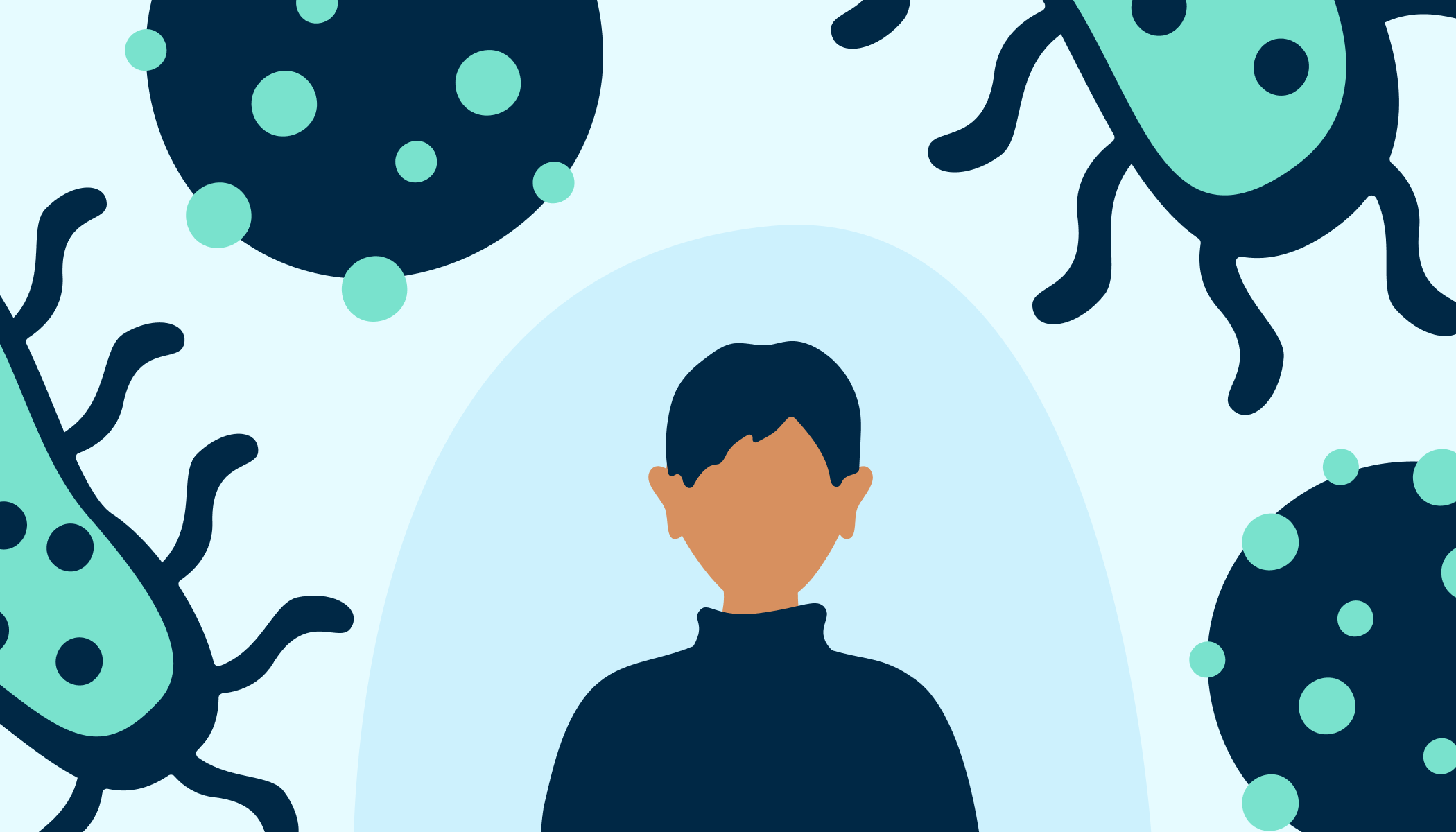Many people experience feelings of anxiety from time to time. But for some, anxiety can go beyond feeling fearful and worried, causing physical symptoms like chest pain.
What are the symptoms of anxiety?
It’s not always easy to recognise the difference between anxiety-related chest pain and pain from something like a heart attack or angina. ‘Everyone will experience anxiety differently, and there’s a wide range of psychological and physical symptoms you might feel,’ says Dr Roshaan Saloojee, a Livi GP.
Some psychological symptoms of anxiety include:
- Feelings of panic or fear
- Feeling tense or always on edge
- Racing thoughts you can’t control
- Difficulty concentrating
- Irritability
Physical symptoms of anxiety can include:
- Sweating or hot flushes
- A fast heartbeat (or sometimes palpitations)
- Feeling dizzy or lightheaded
- Shortness of breath
- A dry mouth
- Stomach ache
- Feeling sick
How does anxiety cause chest pain?
Anxiety is a normal reaction to real or imagined danger. When you’re worried, scared or stressed, you enter ‘fight or flight’ mode. This is your body’s way of preparing you to fight against, or run away from, something that could hurt you.
‘The fight or flight reaction automatically triggers the release of stress hormones like adrenaline,’ says Dr Saloojee. ‘This causes your blood pressure to spike, your heart rate to increase and your breathing to become quick and shallow.’
Like any muscle, the harder your heart works, the more strained and stressed it becomes. ‘You might feel palpitations, spasms and chest pain from muscle tension,’ says Dr Saloojee. ‘The lack of oxygen and increased heart rate can also cause other symptoms like dizziness and shortness of breath.’
What does chest pain from anxiety feel like?
When it comes to the symptoms of anxiety, everyone has a different experience, and anxiety chest pain is the same. However, there are some common patterns to how it feels and how long it lasts.
Chest pain from anxiety can include:
- A sharp or stabbing pain that stays in the chest area
- Tightness
- Pressure
- Burning
- A dull ache
- Twitching in the chest
For some people, the anxiety can intensify into a panic attack, causing tight chest pain along with emotional distress.
‘Anxiety chest pain usually comes on quickly and goes away quickly,’ Dr Saloojee says. ‘You will typically start to feel better after around 10 minutes. For a while afterwards, some people might feel some soreness or an ache in their chest because of the muscle contractions.’
What’s the difference between anxiety chest pain and a heart attack?
Chest pain from anxiety can sometimes be confused with other problems, like a heart attack.
‘In comparison with anxiety chest pain, pain from a heart attack will worsen with activity and last longer (more than 20 minutes),’ says Dr Saloojee.
‘Heart attack chest pain often feels like a squeezing, heavy or intense pressure on the chest. It can spread to other parts of the body, like the arms, shoulders, back and jaw. You may also experience sweating, nausea, coughing or wheezing.’
Over time, you might start to recognise when chest pain is due to anxiety. But if you’re ever worried that your chest pain is something more serious, seek medical help.
How can I stop anxiety chest pain?
The best treatment for your chest pain will depend on what’s causing it. If your chest pain is caused by anxiety, the best course of action is to treat the underlying cause.
1. Try a breathing exercise
‘Practise taking deep and slow breaths, or try a specific breathing exercise, like diaphragmatic breathing,’ says Dr Saloojee. ‘Effective deep breathing can help to control your breath, reduce your heart rate and stop an anxiety attack before it gets worse.’
2. Use relaxation techniques
Techniques like meditation or visualising a safe place can also help calm you down. They can help reduce racing anxious thoughts, relaxing the brain and body. There are lots of apps and websites that can guide you through different meditation techniques.
3. Keep active
Lifestyle changes have been shown to help manage anxiety, too. Regular exercise can reduce muscle tension and release chemicals like serotonin that make you feel happier and more relaxed.
4. Prioritise sleep
Getting enough good quality sleep can also reduce feelings of anxiety. Aim for a regular bedtime routine and 7-9 hours of sleep a night. Also try to cut down on caffeine and alcohol consumption, which can increase anxiety if consumed in excess.
When do I need to seek help for chest pain?
‘Chest pain shouldn’t be ignored,’ warns Dr Saloojee. ‘If you’re experiencing chest pain, it’s important to speak to your doctor, especially if it’s persistent and interfering with your daily life.
‘Even if your chest pain is anxiety related, it’s important to exclude a heart problem to ensure you get the right treatment. To do this, your doctor will take a history of your symptoms and may perform a few simple tests like a blood test or ECG.’
If your anxiety is becoming too difficult to manage by yourself, there are treatments to help. Speak to your GP who may refer you for talking therapies like cognitive behavioural therapy (CBT). There are also medications that may help manage the symptoms of anxiety.
This article has been medically reviewed by Dr Roshaan Saloojee, a Livi GP.


